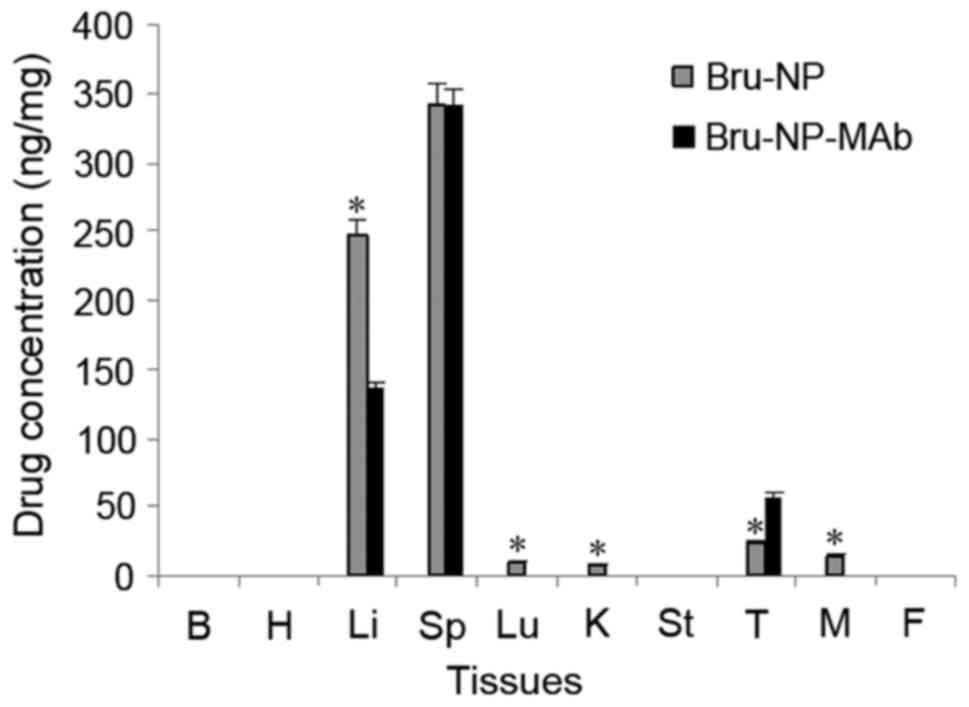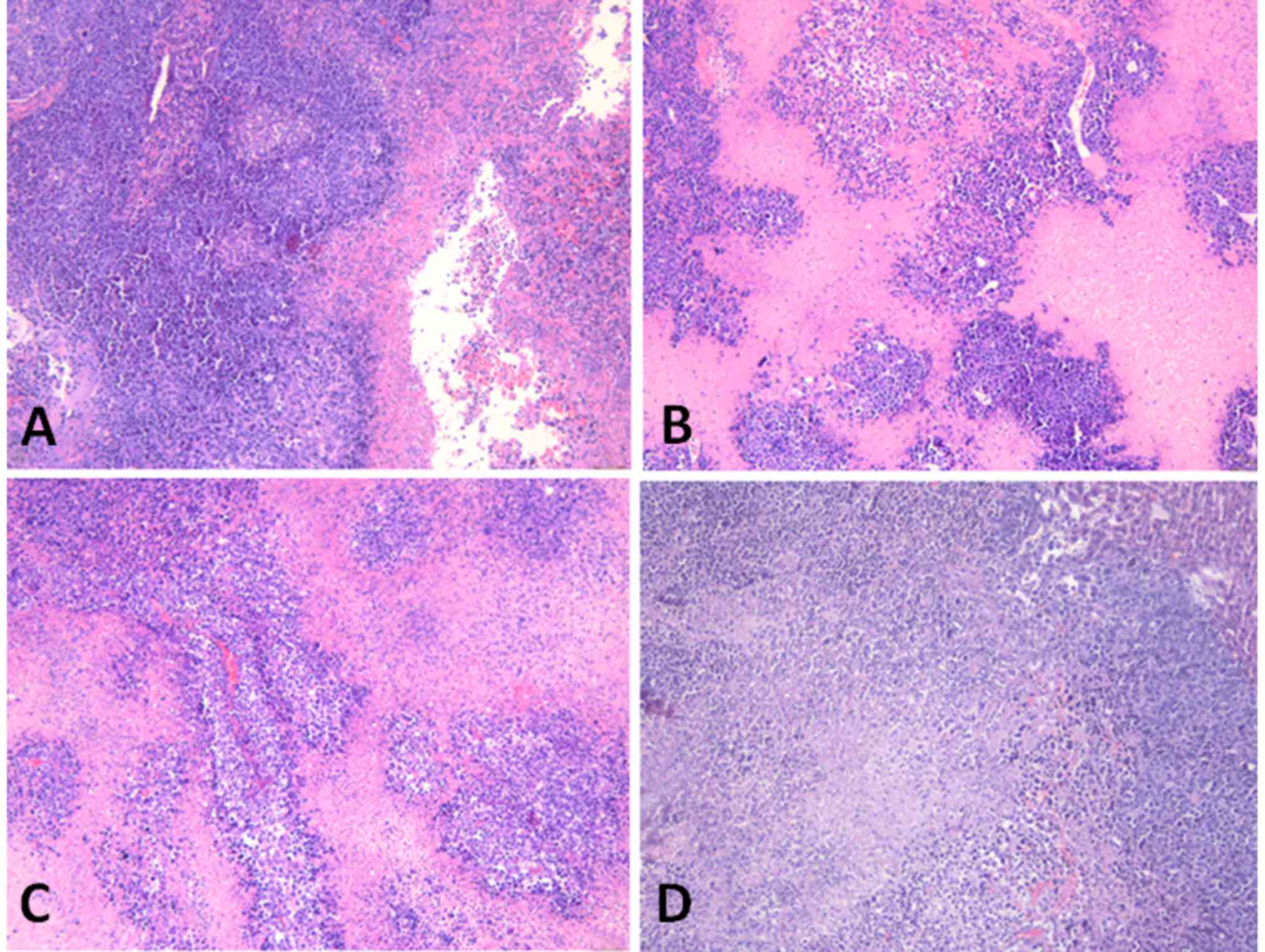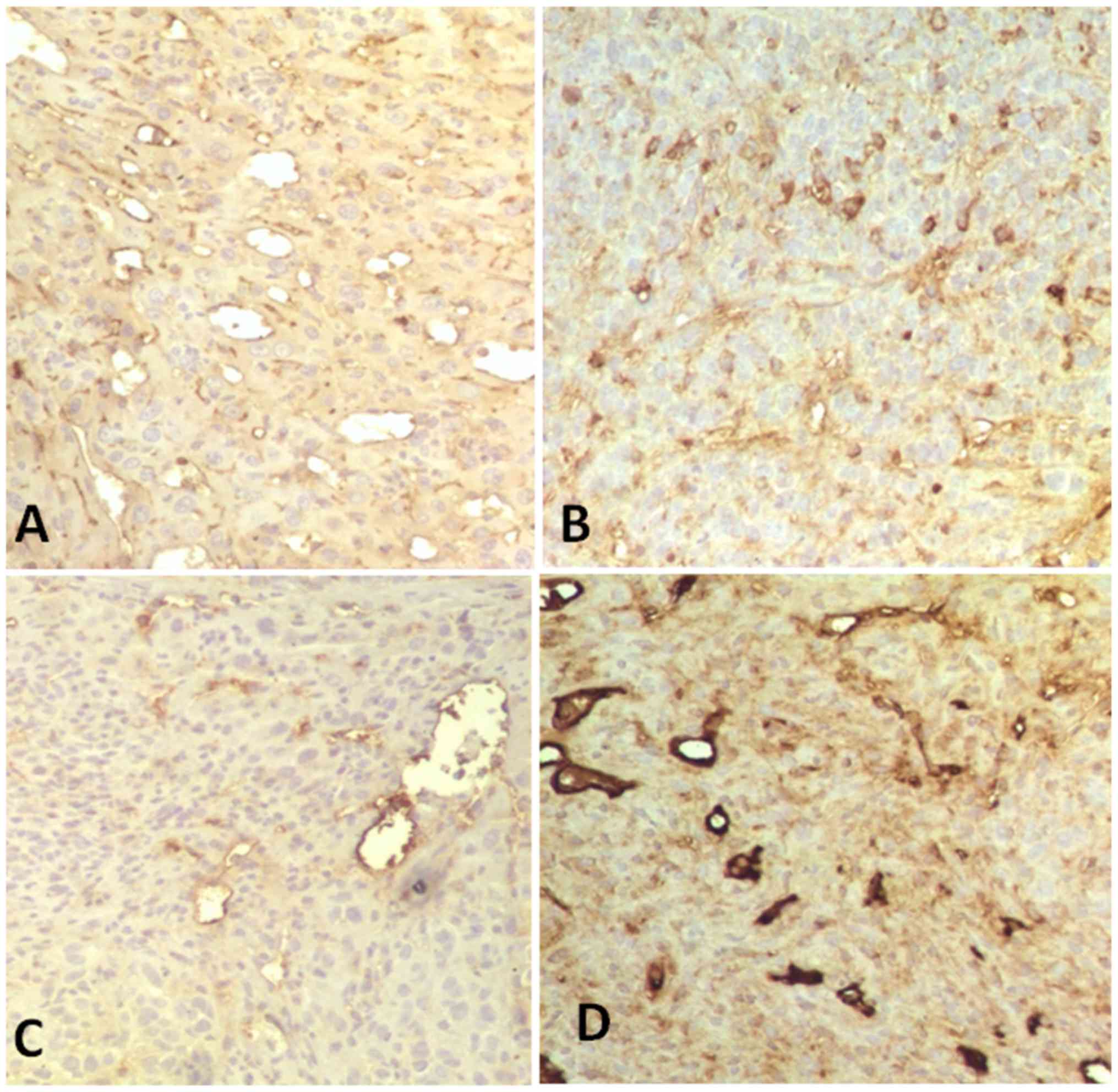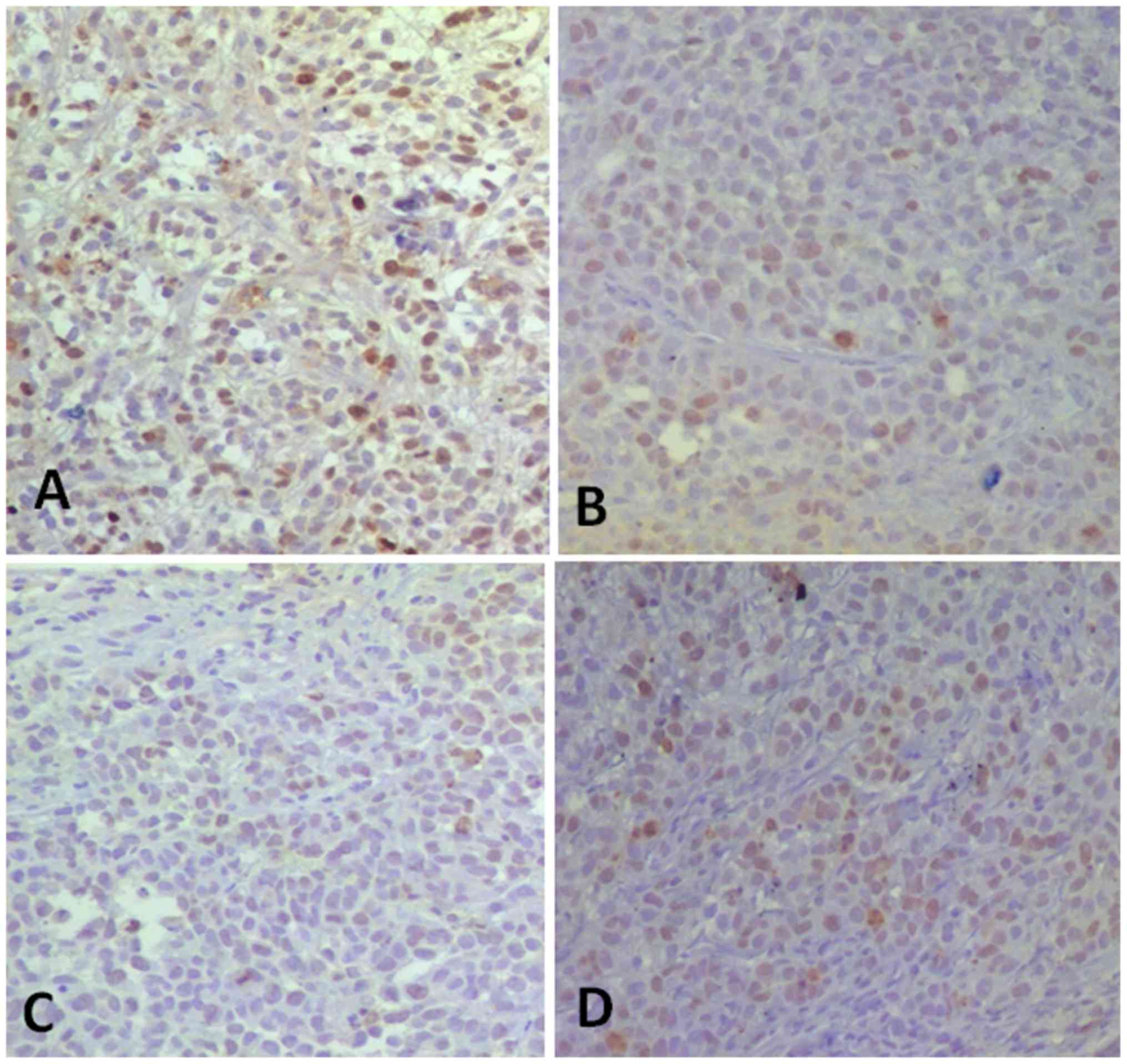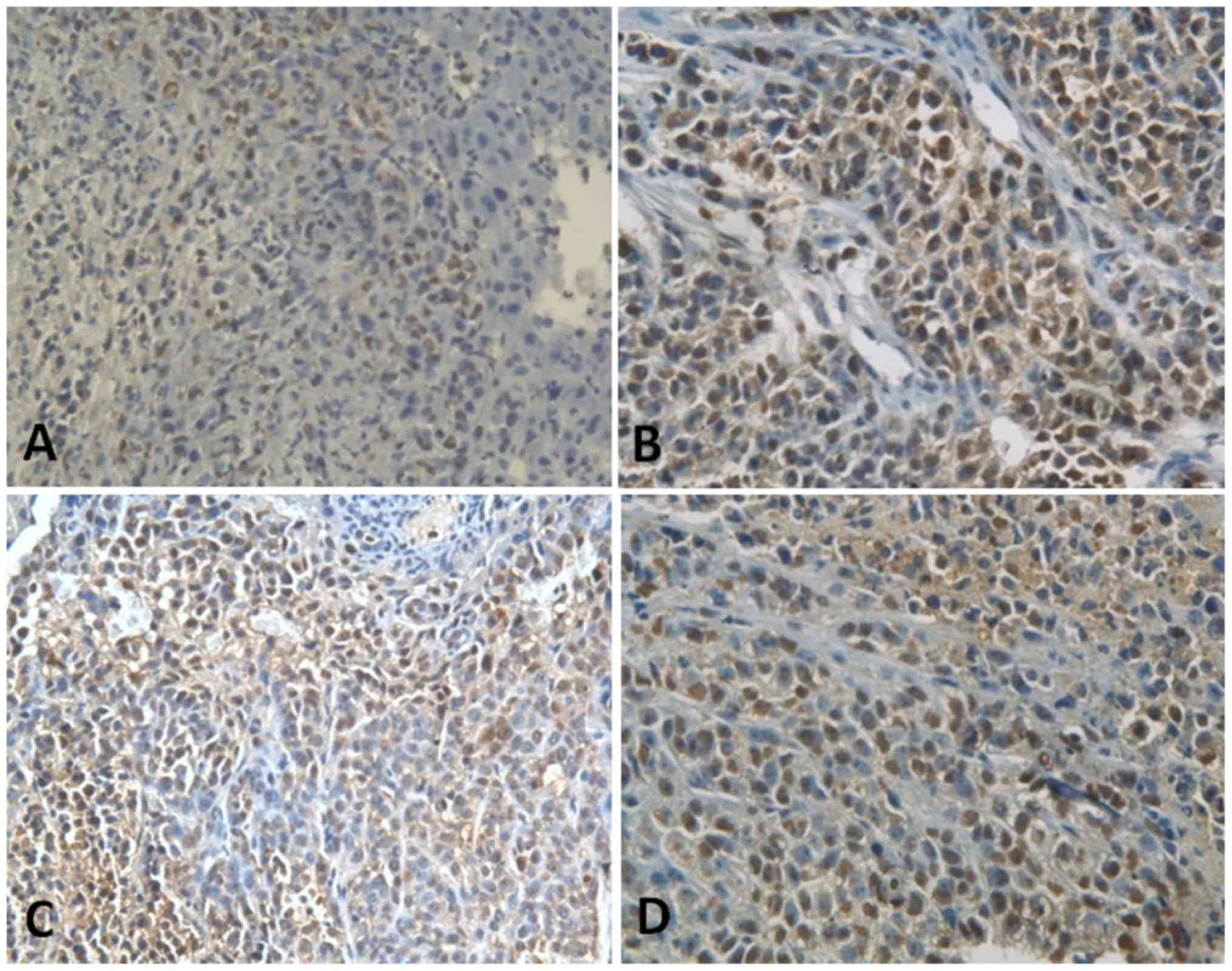|
1
|
Parkin DM, Bray F, Ferlay J and Pisani P:
Global cancer statistics, 2002. CA Cancer J Clin. 55:74–108. 2005.
View Article : Google Scholar : PubMed/NCBI
|
|
2
|
Tang ZY, Ye SL, Liu YK, Qin LX, Sun HC, Ye
QH, Wang L, Zhou J, Qiu SJ, Li Y, et al: A decade's studies on
metastasis of hepatocellular carcinoma. J Cancer Res Clin Oncol.
130:187–196. 2004. View Article : Google Scholar : PubMed/NCBI
|
|
3
|
Liu CL and Fan ST: Nonresectional
therapies for hepatocellular carcinoma. Am J Surg. 173:358–365.
1997. View Article : Google Scholar : PubMed/NCBI
|
|
4
|
Yang TS, Wang CH, Hsieh RK, Chen JS and
Fung MC: Gemcitabine and doxorubicin for the treatment of patients
with advanced hepatocellular carcinoma: A phase I–II tria1. Ann
Oncol. 13:1771–1778. 2002. View Article : Google Scholar : PubMed/NCBI
|
|
5
|
Qin JM, Xu XJ, Sheng X, Li Q, Yin PH,
Zhang M, Yang L and Sang ZQ: Anti-hepatocellular carcinoma study of
the brucine in rats. Chin J Gen Surg. 26:219–221. 2011.(In
Chinese).
|
|
6
|
Deng X, Yin F, Lu X, Cai B and Yin W: The
apoptotic effect of brucine from the seed of Strychnos
nux-vomica on human hepatoma cells is mediated via Bcl-2 and
Ca2+ involved mitochondrial pathway. Toxicol Sci.
91:59–69. 2006. View Article : Google Scholar : PubMed/NCBI
|
|
7
|
Deng XK, Cai BC, Yin W, Liu TS, Sun Q and
Li WD: Research of the anti-tumor effect and toxicity of brucine in
Heps tumor-bearing mice. Chin Pharmacol Bulletin. 22:35–39.
2006.(In Chinese).
|
|
8
|
Deng XK, Cai BC, Yin W, Zhang XC, Li WD
and Sun Q: Brucine on mouse tumor inhibition. Chin J Nat Med.
3:392–395. 2005.(In Chinese).
|
|
9
|
Qin JM, Zhang YD, Wang HY and Wu MC:
Nanotechnology usage in diagnosis and treatment of liver diseases.
Chin J Modern Med. 13:49–52. 2003.(In Chinese).
|
|
10
|
Qin JM, Zhang YD, Wang HY and Wu MC: Usage
and progress of nanodrug in hepatic disease. Chin J Hepatobiliary
Surg. 10:646–648. 2004.(In Chinese).
|
|
11
|
Gao Y, Li HL, Lv QZ and Zhai GX:
Application of active transport path in targeting drug delivery
system of liver. Chin J Pharmaceuticals. 39:542–547. 2008.(In
Chinese).
|
|
12
|
Qin JM, Yin PH, Li Q, Sa ZQ, Sheng X, Yang
L, Huang T, Zhang M, Gao KP, Chen QH, et al: Anti-tumor effects of
brucine immuno-nanoparticles on hepatocellular carcinoma. Int J
Nanomedicine. 7:369–379. 2012. View Article : Google Scholar : PubMed/NCBI
|
|
13
|
Gregoriadis G: Liposome Technology. 3. CRC
Press; Boca Raton, FL: pp. 751984
|
|
14
|
Hou XM, Cui LL, Li GD and Li WH: Advance
on targeted drug delivery in cancer therapy. J Pharm Pract.
25:273–275. 2007.
|
|
15
|
Vasir JK and Labhasetwar V: Targeted drug
delivery in cancer therapy. Technol Cancer Res Treat. 4:363–374.
2005. View Article : Google Scholar : PubMed/NCBI
|
|
16
|
Stefani M, Coudane J and Vert M: In vitro
ageing and degradation of PEG-PLA diblock copolymer-based
nanoparticles. Polymer Degradation Stability. 91:2554–2559. 2006.
View Article : Google Scholar
|
|
17
|
Lu Y, Li J and Wang G: In vitro and in
vivo evaluation of mPEG-PLA modified liposomes loaded
glycyrrhetinie acid. Int J Pharm. 356:274–281. 2008. View Article : Google Scholar : PubMed/NCBI
|
|
18
|
Park EK, Lee SB and Lee YM: Preparation
and characterization of methoxy poly(ethylene
glyco1)/poly(epsilon-caprolactone) amphiphilic block copolymeric
nanospheres for tumor-specific folate-mediated targeting of
anticancer drugs. Biomaterials. 26:1053–1061. 2005. View Article : Google Scholar : PubMed/NCBI
|
|
19
|
Wei Q, Wei W, Tian R, Wang LY, Su ZG and
Ma GH: Preparation of uniform-sized PELA microspheres with high
encapsulation efficiency of antigen by premix membrane
emulsification. J Colloid Interface Sci. 323:267–273. 2008.
View Article : Google Scholar : PubMed/NCBI
|
|
20
|
van der Heiden PL, Jedema I, Willemze R
and Barge RM: Efficacy and toxicity of gemtuzumab ozogamicin in
patients with acute myeloid leukemia. Eur J Haematol. 76:409–413.
2006. View Article : Google Scholar : PubMed/NCBI
|
|
21
|
Adams GP and Weiner LM: Monoclonal
antibody therapy of cancer. Nat Biotechnol. 23:1147–1157. 2005.
View Article : Google Scholar : PubMed/NCBI
|
|
22
|
Wu AM and Senter PD: Arming antibodies:
Prospects and challenges for immunoconjugates. Nat Biotechnol.
23:1137–1146. 2005. View
Article : Google Scholar : PubMed/NCBI
|
|
23
|
Kan HP, Liu ZG, Tan YF, Lin YX, Li CF and
Zhou J: Preparation of immune nanospheres of human liver cancer and
observation of anti-cancer effect. J South Med Univ. 28:1503–1505.
2008.(In Chinese).
|
|
24
|
Liu XB and Cai MY: Preparation of immune
nanospheres of human liver cancer and identification of
immunological properties in vitro. Chin J Immunol. 16:262–265.
2000.(In Chinese).
|
|
25
|
Li L: Study outline of effect and
attenuation of brucine. Asia-Pacific Trad Med. 5:19–21. 2007.(In
Chinese).
|
|
26
|
Wang L, Cai BC, Yang H, YU ZL, Deng XK and
Zhang ZJ: A Comparative study on pharmacokinetics of vauqueline
solution and vauqueline liposome in rabbits. J Nanjing TCM Univ.
22:165–167. 2006.(In Chinese).
|
|
27
|
Qu YQ, Guo YQ, Ha HX, Chen J and Cai BC:
Comparison of the antitumor effect between brucine stealth liposome
and brucine conventional liposome. J Trad Chin Drug Res Clin
Pharmcol. 19:361–363. 2008.(In Chinese).
|
|
28
|
Wu J, Nantz MH and Zern MA: Targeting
hepatocytes for drug and gene delivery: Emerging novel approaches
and applications. Front Biosci. 7:d717–725. 2002. View Article : Google Scholar : PubMed/NCBI
|
|
29
|
Kan HP, Tan YF, Li KF and Zhou J:
Preparation and anticancer effects of immunonanospheres containing
paclitaxel against human liver cancer. J Mod Dig Interven.
15:227–229. 2010.(In Chinese).
|
|
30
|
Hu KQ, Kyulo NL, Lim N, Elhazin B,
Hillebrand DJ and Bock T: Clinical significance of elevated
alpha-fetoprotein (AFP) in patients with chronic hepatitis C, but
not hepatocellular carcinoma. Am J Gastroenterol. 99:860–865. 2004.
View Article : Google Scholar : PubMed/NCBI
|
|
31
|
Montaser LM, Abbas OM, Saltah AM and Waked
IA: Circulating AFP mRNA as a possible indicator of hematogenous
spread of HCC cells: A possible association with HBV infection. J
Egypt Natl Cancer Inst. 19:48–60. 2007.
|
|
32
|
Kamiyama T, Takahashi M, Nakagawa T,
Nakanishi K, Kamachi H, Suzuki T, Shimamura T, Taniguchi M, Ozaki
M, Matsushita M, et al: AFP mRNA detected in bone marrow by
real-time quantitative RT-PCR analysis predicts survival and
recurrence after curative hepatectomy for hepatocellu1ar carcinoma.
Ann Surg. 244:451–463. 2006.PubMed/NCBI
|















